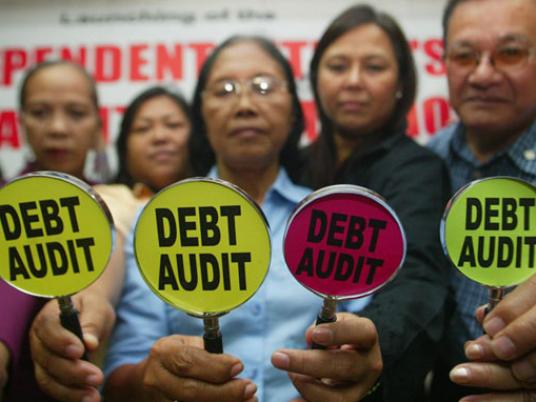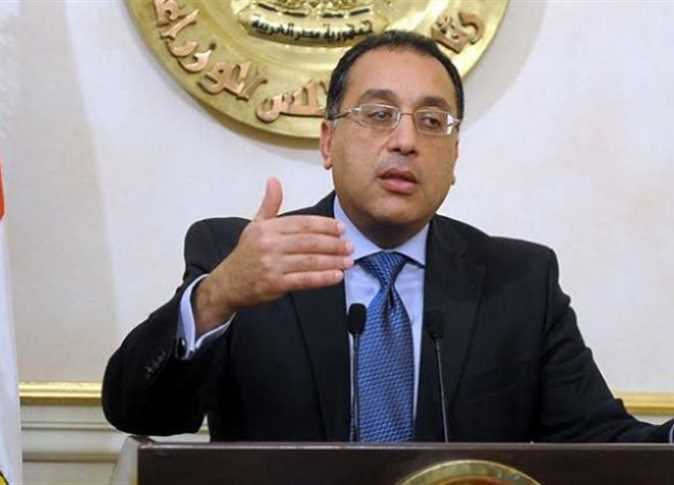
Egypt has a budget deficit of nearly 10 percent of GDP and the finance minister recently said that the country is on the brink of a liquidity crisis. Meanwhile, economic growth has slowed since the uprising, decreasing government revenues, while public sector workers around the country are striking to raise wages that have been stagnant for decades. Egypt is in a tight fiscal spot.
But a group of Egyptian and international activists have a solution that would take pressure off the budget and at the same time undue the economic legacy of Hosni Mubarak’s corrupt regime. The Popular Campaign to Drop Egypt’s Debt, a coalition of civil society groups and concerned individuals, are calling for a comprehensive public debt audit with the eventual aim of debt forgiveness from foreign lenders.
“This is a popular movement that aims to facilitate Egypt's economic independence from the many forms of exploitation, subordination and resource misappropriation that were imposed upon the people of Egypt during the past decades by the regime of the ousted dictator Hosni Mubarak and his collaborators abroad,” the campaign wrote in its founding statement.
The campaign, which has been growing since it began on Facebook in March, will kick off publicly with a “Global Day for Egyptian Debt Audit/Cancellation” on 31 October, marked by events in Cairo, as well as Paris, Berlin and London – the capitals of some of Egypt’s biggest creditors. The campaign here has earned the support of some prominent civil society organizations in addition to individual activists, economists and economics journalists.
Organizers hope that this will help push the issue of debt forgiveness into the public conversation in Egypt and among governments that hold Egyptian debt.
“What we’re trying to do is draw public attention, because no one is talking about it,” says Noha al-Shoky, one of the founders of the campaign. “The masses don’t understand that we have a situation at hand here.”
The conference in Cairo will also feature Fathi Chamkhi, a Tunisian university professor who is also leading a similar campaign at home. Those involved in the campaign are hoping that in the wake of the uprisings in the North African countries there is a chance for a clean break with the economic legacies of the fallen regimes.
Budget problems, debt solutions?
International credit rating agencies downgraded Egypt’s sovereign debt rating earlier this month due in part to fears about the high budget deficit.
By the end of the fourth fiscal quarter of the 2010/11 fiscal year, Egypt will hold almost US$35 million in external debt, most of it medium- or long-term, according to the Central Bank of Egypt, which also states that the government pays US$3.4 billion in interest on foreign debt. In addition to this, Egypt has about four times as much debt held by local banks.
Economists and analysts point to a number of other problems that contribute to the high budget deficit, such as massive spending on untargeted subsidies. But debt relief could be a major step toward solving the problem.
At the same time, though, the military-backed interim government is looking elsewhere for budget support.
Planning and International Cooperation Minister Fayza Abouelnaga, who is responsible for international agreements, is currently negotiating with the G8 industrialized states, Gulf countries and International Monetary Fund (IMF) and World Bank in an attempt to secure US$35 billion in loans and economic assistance, according to a government statement earlier this week.
Abouelnaga also announced on Tuesday that she would begin negotiations with the IMF for a US$3 billion loan, the same amount that the cabinet rejected from the IMF in June.
“Given the status of the huge budget deficit and borrowing from abroad, then definitely we need some kind of relief from the debt we have from the past, which is actually more than a third of the budget,” says Ahmed Ghoneim, a professor of economics at Cairo University who is not affiliated with the campaign in any way. “Any kind of initiative [for debt forgiveness] could help the economy.”
Also, some activists hope, wiping some US$30 billion from the ledger book could free up more funds for the social justice spending that many demand, from doctors who are asking for more money for public health to public sector workers demanding better wages.
Moreover, an infusion of foreign capital in the form of debt relief could help spur Egypt’s economic recovery, says Amr Adly, an economist with the NGO Egyptian Initiative for Personal Rights, which has backed the campaign. Improved economic conditions will help produce political stability in the long-term, Adly says.
A time for transparency
Before debt is forgiven, the organizers of the campaign plan to hold a public debt audit, in which Egyptians fully examine the money owed in their names.
A debt audit is a comprehensive examination of what debts are owed to whom and how money has been used. Some of this information is publicly available, but is rarely looked at by people outside the economic elite responsible for making decisions.
The campaigners hope to involve as many people in the debt audit as possible, from students to civil society members to representatives from the popular committees. Some people have already begun working on this, Shoky says, including economics students who are combing through many CDs of data.
The audit will help introduce a level of transparency that never existed under the Mubarak regime.
"I am not a specialist in economics, but I believe that individuals should be involved in how the country is run,” Wael Khalil, an activist and blogger and member of the campaign said in a statement. “Part of this involvement is through knowledge sharing. The priority is to access information, to access the details and to be able to publish it.”
Public involvement in the debt audit will push for transparency and accountability, Adly says, forcing lenders to take into consideration the legitimacy of the governments that they are lending to.
Mubarak’s odious legacy
Debt cancellation campaigners believe that they can make a strong case for the cancellation of Egypt’s debts based on the principle of “odious debt,” a legal theory that holds that debts made by a government that are not in the people’s national interests are illegitimate and should be forgiven once the autocratic regime is removed from power.
Precedents for this date back to the 19th century.
Recently, after the United States invaded Iraq and deposed Saddam Hussein, Washington succeeded in convincing many Western lenders to forgive Iraq’s foreign debts incurred under the former leader’s regime. Post-Mubarak Egypt should fall under the same logic, the debt cancellation campaigners believe.
“The whole idea of odious debt challenges the conclusion of the debt in the first place, saying that the government that signed the debt was not legitimate and borrowers didn’t keep up safeguards of having parliamentary supervision, monitoring,” says Adly.
“There’s been a lot of talk by Western governments about supporting people instead of dictators, so we’re challenging them to put their money where their mouths are,” says Philip Rizk, a co-founder of the campaign.




